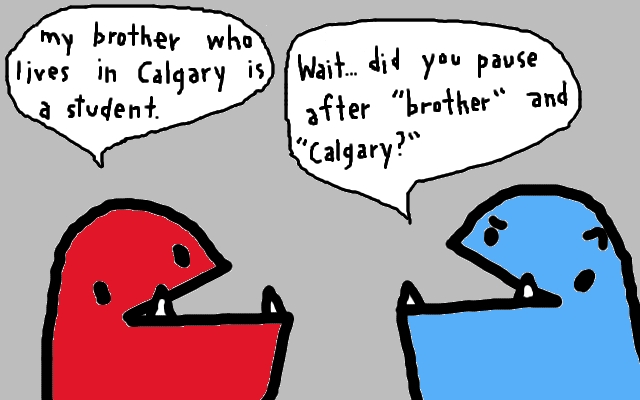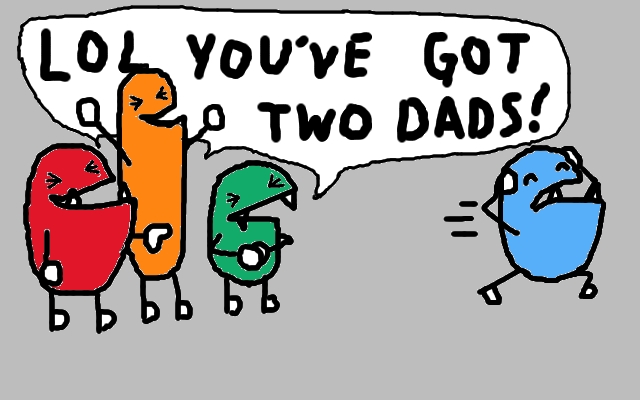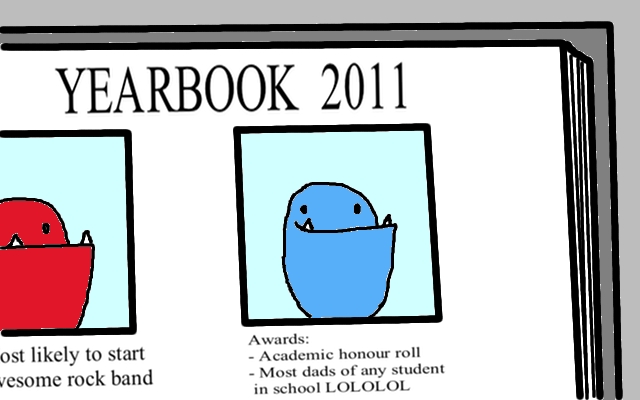What is the difference in meaning between these two sentences?
My brother, who lives in Calgary, is a student.
My brother who lives in Calgary is a student.
The speaker of the first sentence has ONE brother, the speaker of the second sentence has MORE THAN ONE brother.
In both sentences, “who lives in Calgary” is a relative clause.
In the first sentence, the relative clause serves the purpose of giving the reader extra information about the subject (my brother). This is known as a NON-DEFINING RELATIVE CLAUSE. It is simply “plugged in” the sentence as extra information. Note that non-defining relative clauses are always separated by commas. Because non-defining relative clauses are not necessary, they can always be removed without hindering the comprehensibility of the sentence. Thus, removing the clause leaves us with “My brother is a student.” From this, we can infer that the speaker has only one brother.
In the second sentence, the relative clause is a DEFINING RELATIVE CLAUSE. Defining relative clauses (surprisingly enough) serve to define the preceding subject or object of the sentence (i.e. the sentence NEEDS the clause). Thus, in this case, we can infer that the use of a defining relative clause serves to determine WHICH brother is a student. (ex: My brother who lives in Calgary is a student, and my brother who lives in Vancouver is a firefighter).
Therefore, those two little commas separating the relative clause can be very important. Remember our hapless friend who upset his girlfriend with his misuse of an apostrophe? He tried to smooth things over:
Other examples of non-defining relative clauses:
My nephew David, who was given candy, was happy
Her children, who accepted candy from the creepy stranger, were never heard from again.
My roommate’s dog, which is functionally retarded, chews electrical wires.
In all of these examples, the relative clause is not necessary
Note the differences when using defining relative clauses:
The kids who/that got candy were happy
The kids who/that accepted candy from the creepy stranger were never heard from again.
The dog which/that is functionally retarded and chews on electrical wires belongs to my roommate.
In all of these examples, the relative clause is necessary
Thankfully, it doesn’t have to be this tricky. Generally speaking, with defining relative clauses that compliment people or things, “that” is the preferred relative pronoun. Using “that” instead of “who” or “which” does a few things. It helps get rid of any potential ambiguity in spoken English:
It’s also more natural sounding. Here is the first example, rewritten so the defining relative clauses use “that” instead of “who”:
– My brother that lives in Calgary is a student
– My brother, who lives in Calgary, is a student
Using “that” in a defining relative clause isn’t any more grammatically correct than “who” or “which,” but it makes things a lot clearer.
In summation: Try to avoid mixing the two types of relative clauses up, especially if you go to a school with:
GRAMMATICALLY CONSCIOUS BULLIES






























baaahahaa! “Your father ‘that’s’ a cop?” “A ‘defining’ relative clause?” Those are absolutely hilarious! You should do a post about the improper use of apostrophe’s in plural noun’s that are not possessive or contraction’s. I could seriously go around my city and take pictures of all the signs that have this error.
Done, and done.
https://stopgrammartime.wordpress.com/2011/08/17/apostrophes/
Oh no, that poor little blue guy! I’m laughing my ass off here. These are great. Who said good grammar is boring??!
Thanks! Doesn’t have to always be boring 🙂
OMG! No body in my HS english class gets this!
Most amusing. Funnier than Grammar Girl.
Thanks so much! Feel free to share this if you like 🙂
BE MY ENGLISH TEACHER. PLEASE. I BEG OF YOU.
You just explained a grammar problem that has been confusing me for three years and that millions (read: I’m exaggerating, it’s probably just hundreds) of teachers tried to explain to me, IN ONE BLOG POST.
I shall pay you plenty, promise.
Oh. And I’m a grammar bully. Sorreeeee. 😀
Excellent! Love eet.
Haha, this is definitely my favorite blog of yours. Loved the relative clause examples, keep up the great work!
If I may pedantically fuss you just the slightest: my girlfriend, whom I upset, is so important to me.
Absolutely it should be the object pronoun “whom”. Stylistic choice here: I didn’t want to get into “who” vs. “whom” (a post for another day), and let’s face it, that little critter’s grammar is (tragically) poor to begin with. Also, using “who” in the place of “whom,” while not grammatically correct, is colloquially fine. Cheers!
I love the little blue guy. I am also glad to have found your blog because I need to learn better grammar. My ideas are good, my writing is not!
Thanks!! Hope you enjoy all the comics 🙂
Its like my brain is a cat, and this blog is a human hand petting it over and over again.
Best comment on any of my posts. Well done, sir.
Wow! This is very informative and fun! 😉
I just tweeted this as a review to my class for their upcoming test. Funny enough the example I always use involves having two dads! (We do another one with “my friend”, where it usually doesn’t use commas unless you mean you only have one friend…which is tres sad).
This is a very enjoyable site.
Isn’t there a rule to use ‘who’ for people and ‘that’ for animals and objects? Really, one should not say ‘my brother that’ or ‘my dad that is’ (unless the intention is something like, ‘my brother that genius’ or ‘my dad, that is, my father’).
Pingback: Lecture & Group Work: Commas | ENGLISH 101-166: Tuesdays
Pingback: Commas – Lecture & Group Work | English 101-064, Fridays 9-12:30